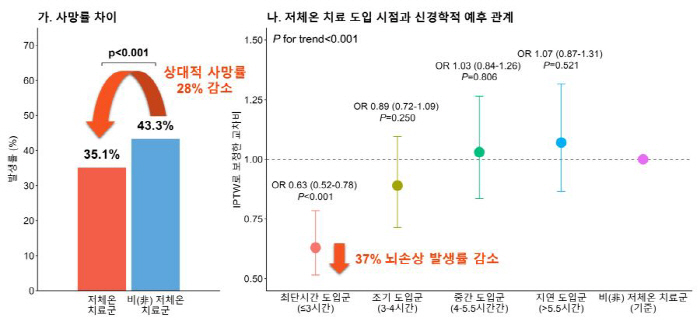Out-of-hospital cardiac arrest patients due to myocardial infarction increase survival rate with hypothermia treatment
Apr 10, 2025
|
Hypothermic treatment, which is mainly applied to cardiac arrest and stroke, is a treatment that quickly lowers the patient's body temperature to 32 to 36 degrees to maintain a low body temperature for a certain period of time and gradually returns normal body temperature according to the patient's recovery.
Although there have been many studies presenting conflicting results on the effectiveness of hypothermia treatment, not many studies have focused on the group of severe patients with cardiac arrest caused by myocardial infarction.
A research team led by Professor Lee Oh-hyun, Bae Sung-ah and Kim Yong-chul of the Department of Cardiology at Yongin Severance Hospital and Dr. Heo Seok-jae of Yonsei University's Life System Information Class analyzed data from 2,925 unconscious people who underwent emergency coronary intervention (PCI) for acute myocardial infarction among more than 180,000 cases of out-of-hospital cardiac arrest (OHCA) that occurred in Korea from 2016 to 2021.
As a result of the study, the hypothermia-treated group had a very lower mortality rate (35.1% in the treatment group and 43.3% in the non-treatment group), and the relative mortality rate decreased by 28% even after adjusting for factors that could affect death.
As a result of analyzing the time taken from hospital arrival to treatment by dividing it into quartiles, the shorter the time, the lower the risk of mortality and neurological prognosis deterioration. Patients who started treatment within 3 hours and were treated relatively quickly had a 60% relative risk of death and a 37% reduction in the incidence of brain damage.
Professor Kim Yong-cheol and Professor Bae Sung-ah, co-corresponding authors, explained the significance of the study, saying, "This is the first large-scale study that clearly shows the effectiveness of hypothermic treatment in extremely dangerous situations of cardiac arrest outside the hospital due to myocardial infarction. Since it is the result of analyzing actual clinical data at the national level, it is an important basis for immediate application to clinical sites."
Professor Lee Oh-hyun, the first author, said "The most noteworthy point in this study is that the timing of hypothermic treatment greatly affects the outcome."This suggests that medical staff's prompt treatment decision and implementation are of paramount importance."
The results of this study were published in the international journal 'BMC Medicine (IF 7.1)' and are expected to have a significant impact on future treatment guidelines for patients with myocardial infarction and cardiac arrest.
|
This article was translated by Naver AI translator.















